Stronger
Together
With an eye to the future, Broad Spartans aim higher, think bigger and bring strengths together to transform the future of business.
Tomorrow’s Education, Today
Broad staff take the lead to pivot MSU online and pave the way for the future of education.
FEATURE
Pivoting MSU online amid the pandemic was a monumental feat that called on many Spartans to accomplish the task practically overnight. The transition was a huge success, training nearly 1,000 faculty members on how to teach virtually, conducting all summer 2020 classes online and delivering delivering accessible education programs for the entire Spartan community.
Broad College staff not only played a key role in leading this charge but are now continuing to pilot new efforts to ensure Spartans have a positive journey forward.
Emphasis on meaningful instruction
Jeremy Van Hof, director of learning technologies and development, and Sarah Wellman, learning design specialist, were instrumental to the university’s efforts, alongside their counterparts at the College of Arts and Letters and College of Natural Sciences.
Van Hof has been working closely with these colleagues for the past three years, which helped the three colleges lead the transition for MSU.
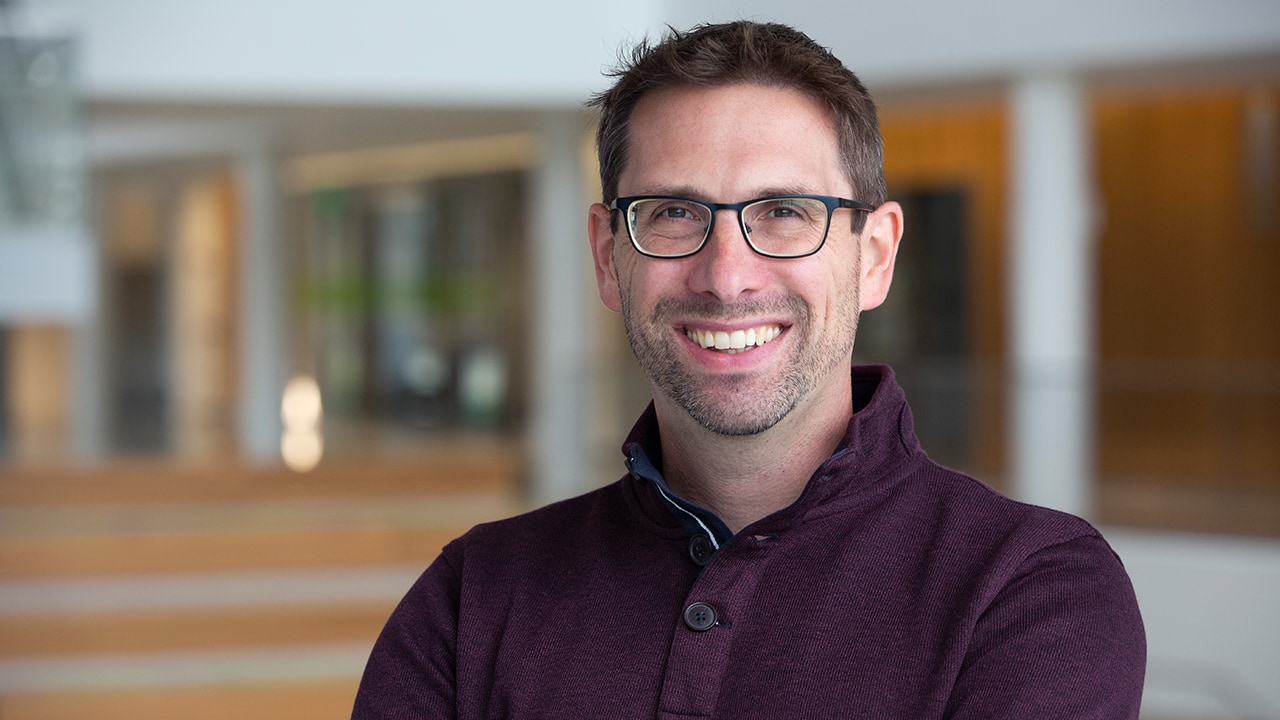
Jeremy Van Hof, director of learning technologies and development
“Our support of teaching and learning since March has relied on meaningful collaborations and trusting relationships, which allowed us to create hundreds of support documents and training events without redundancy,” Van Hof said.
To get the job done, the team brought in partners from the College of Agriculture and Natural Resources, the College of Communication Arts and Sciences, the College of Education, MSU Libraries, MSU Information Technology, the MSU Hub, and the Resource Center for Persons With Disabilities to build two online training programs — one synchronous and one asynchronous.
“The connections built across campus in the last five months will serve the [Broad] College and all of MSU well in the years ahead, as we continue to try to create the safest and most effective learning environment possible for our students,” he continued.
Seeing the central role that the team played in leading the university through the pandemic, Melissa Woo, senior vice president for information technology and chief information officer, tasked the three colleges to work together again in preparation for the fall.
Van Hof said the team’s next job was “to think about ways MSU could transform online learning into something even more meaningful — something that would separate MSU from the pack instructionally as we head into 2020-2021.”
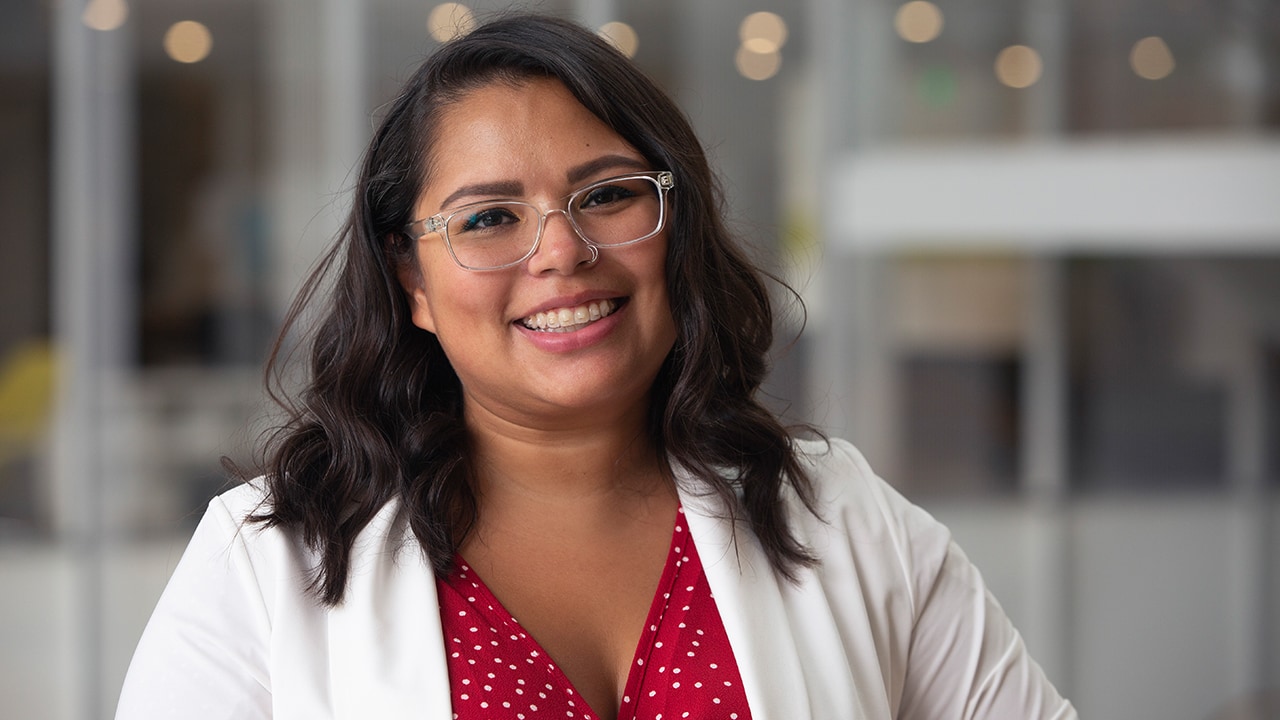
Sarah Wellman, learning design specialist
The collaborative effort, now known as MSU’s Enhanced Digital Learning Initiative, is striving to create compelling, student-centered online environments so that Spartans can advance knowledge and transform lives.
So far, the team has forged a stronger relationship with MSU IT to streamline the educational technology procurement process and secured two new cutting-edge tools to foster an enhanced, dynamic virtual classroom.
“One [tool] allows for threaded video discussions and the other uses artificial intelligence and machine reading to automatically moderate discussion boards in very large classes (making the use of discussions in large classes both possible and meaningful),” Van Hof said. “These tools will be available at no cost to students, saving Broad students over $100,000 in the first semester alone.”
In addition, the team has built out a process to strategically engage with faculty about using the right tools and allowing students to provide feedback about learning experiences. Finally, they’re working to hire additional experts to grow the project through research, grant making and assessment development.
Rooting our work in theory
A key trademark of the group’s efforts has been its application of pedagogical — instructional — theory. Themes of learning by doing, team interaction and authentic assessment are woven into EDLI efforts to deliver purposeful and innovative digital programs.
Decisions tied to the design, content and delivery of learning environments are being informed by primary literature, a concept called evidence-based learning.
Van Hof shared that through the team’s efforts so far, they have focused on creating a culture of care and have used the notion of backwards design, which have also been taught to MSU faculty through their trainings.
“Especially in a time of crisis, having an empathetic and caring tone is essential,” he said. “In all we did, we tried to be driven by the simple mantra of generosity, flexibility and transparency.
“We built the program with the desired end state always guiding our actions. This again was modeling the practices that we taught in the trainings: Begin all planning with a clear understanding of the course outcomes and objectives, design assessments that offer authentic ways for students to demonstrate their understanding of those objectives, create activities and learning events that prepare students for success on those assessments, establish a class culture that centers on accessibility, equity, inclusivity, trust and integrity, and provide students with the tools they will need to thrive in that learning environment.”
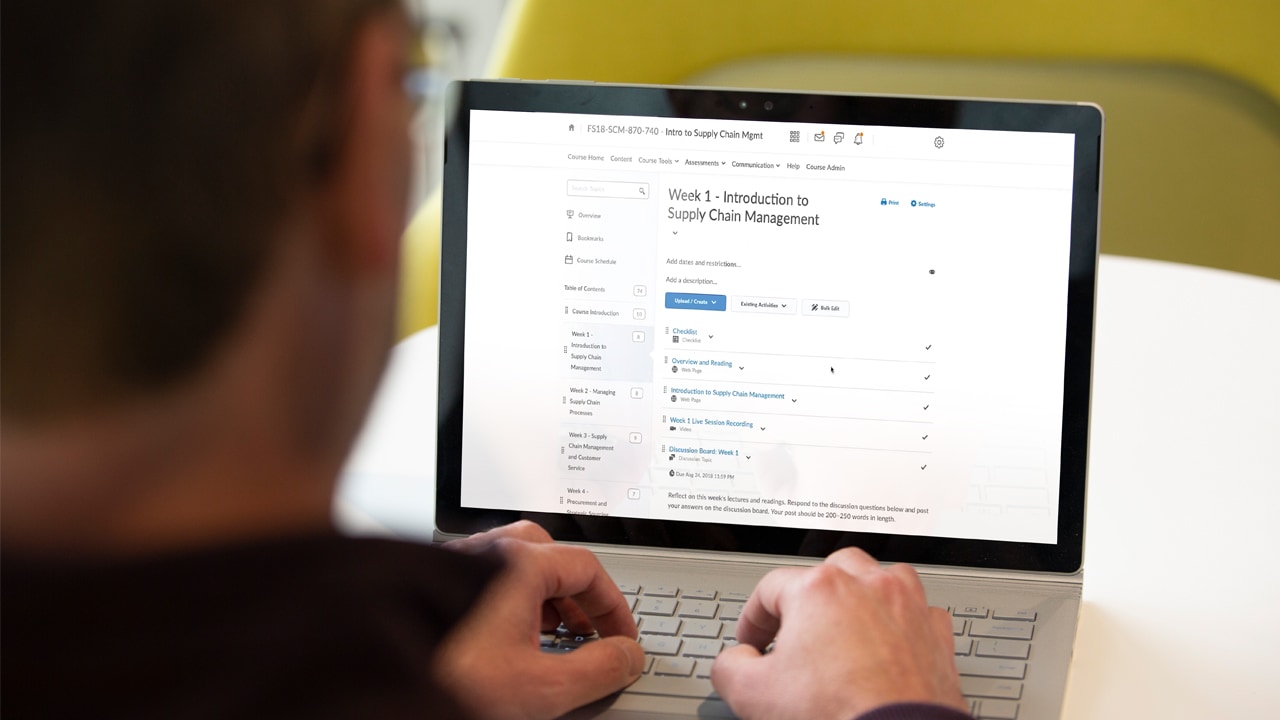
More than 1,000 faculty members were trained on how to teach virtually
The initiative’s efforts have recently extended beyond the banks of the Red Cedar to aid Michigan’s K-12 school districts, at no cost.
EDLI teamed up with Okemos Public Schools to create the Foundations of Successful Online Teaching and Learning series, which offers free support programs for teachers to gain best practices for long-term online learning environments.
With the creation of these new resources and programmatic changes taking place, what will the future of learning look like? Van Hof believes that the work he’s doing at MSU could have a lasting improvement for education.
“COVID-19 has forced us to come to grips with new mindsets and approaches in education,” he said. “In teaching, those mindsets and approaches are ones that we’ve long known would yield positive learning outcomes; we were simply never able to implement them at a large scale because of the general inertia of academia. That inertia was broken in March, when the old way of thinking and doing simply did not work.
“Now, I believe that teachers across the college will see the value in their newly adopted practices and will be enthused about continuing to teach with them,” he continued. “Things like meaningful integration of video into classes, thoughtful mechanisms to drive group interaction, innovative uses of technology to drive engagement — these things are going to linger. On the whole, the new normal post-COVID will be one that sees a broader and deeper implementation of instructional best practices in our classrooms.”
Building tomorrow’s education today is not a small task. The significant work of Van Hof, Wellman and partners around campus are taking MSU to the next level and paving the way for the future of education.
STRENGTH IN NUMBERS
A Beacon for Student Mental and Physical Health
Understanding what students need and providing the resources to help: this alumna steps up.
ALUMNI
MSU boasts a widespread and active alumni network. Broad Spartans can be found advancing the common will in uncommon ways all around the world.
When the pandemic hit in March, Carrie Dorr (B.A. General Business Administration ’96), entrepreneur and founder of Pure Barre, Soul Day Foundation and O44 Method, offered her resources to aid the Spartan community in managing a new wave of stresses and anxieties.
“I believe exercise, both physical and mental, are essential for whole health and are absolutely critical during this time,” Dorr said.
For students, faculty, staff and fellow alumni, Dorr offered at-home workout packages and a series of self-healing exercises to improve mental health, free of charge.
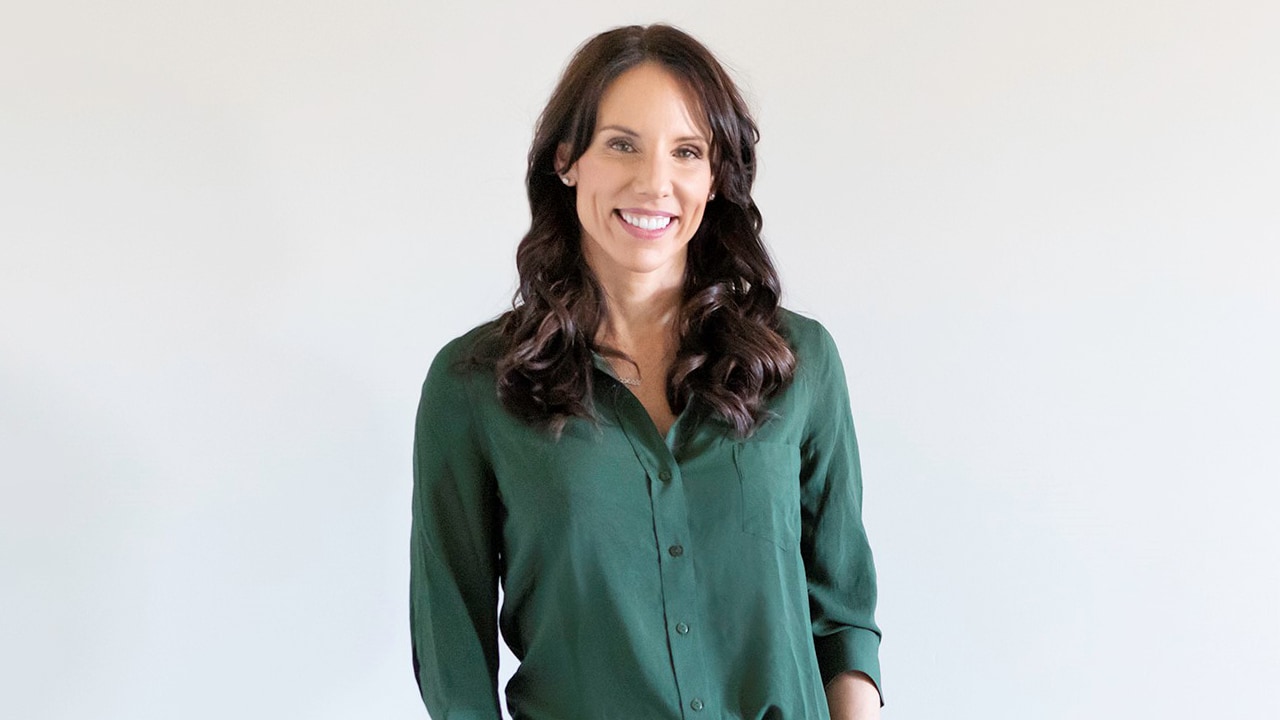
Carrie Dorr, entrepreneur and founder of Pure Barre, Soul Day Foundation and O44 Method
Acting without delay
Prior to the pandemic, plans had been made to recognize Dorr at the Spring 2020 Commencement as the recipient of this year’s Broad College Outstanding Alumni Achievement Award. When Dorr heard news that the in-person event had to be postponed, she acted in the “Spartans Will” spirit, responding immediately with resources to help others in need.
“My heart goes out the students and faculty and staff,” Dorr said. “It is challenging and unnerving for all of us, yet I agree, crises do force innovation.”
Throughout her entrepreneurial career, Dorr has always emphasized wellness for others. “After a couple years of practicing [law], I jumped into entrepreneurship and haven’t looked back,” she said. “My [business] concepts and paths have each been rooted in health, well-being, philanthropy and helping/advising other entrepreneurs.”
Dorr’s resources helped Spartans sweat away stress while sheltering in place and improve mental health through breathing, affirmations and gratitude — and she’s not stopping there.
Ongoing collaboration
“Designing ‘dorm + apartment self-care’ for college students is something I think about often and wish I had back in the day.”
—CARRIE DORR
Now, MSU is preparing to begin a new academic year with physical distancing protocols, safety guidelines and a blend of virtual and in-person courses in place.
Recognizing how these changes will transform the college experience, Dorr has stepped up again as a beacon for student mental and physical health.
Last spring, Dorr quickly expressed interest in continuing her partnership with the Broad College to ensure that students have the resources they need to practice good mental and physical health habits as they begin a new year.
Going forward, she’s hoping to design and offer a student-specific workout and self-care routine that would be tailored to small living spaces, like dorms and apartments — a first for Dorr.
“Designing ‘dorm + apartment self-care’ for college students is something I think about often and wish I had back in the day,” she said.
While this endeavor is in the works, Dorr is also planning to offer promotions on her current workout packages to engage students and others in the Spartan community in the short term.
Dorr not only serves as an example for how alumni can actively support our current students, but her actions and dedicated support also illustrate how we can all be stronger together.
STRENGTH IN NUMBERS
Broad Spartans Make a Difference
With innovation and creativity, our students employ a passionate entrepreneurial mindset.
STUDENTS
At the Broad College, we strive to provide hands-on learning opportunities for our students to push the boundaries and transform the future of business. Whether they’re taking on an innovative entrepreneurial endeavor or crafting creative solutions for real-world problems, Broad Spartans are determined to make a difference.
Having the right material
Take Jackie Smythe, a sophomore in supply chain management who became a cofounder of her own company at the age of 18. She attended MSU’s Freshman Seminar Abroad in Costa Rica and was inspired to thread her passions of fashion and sustainability together into a business.
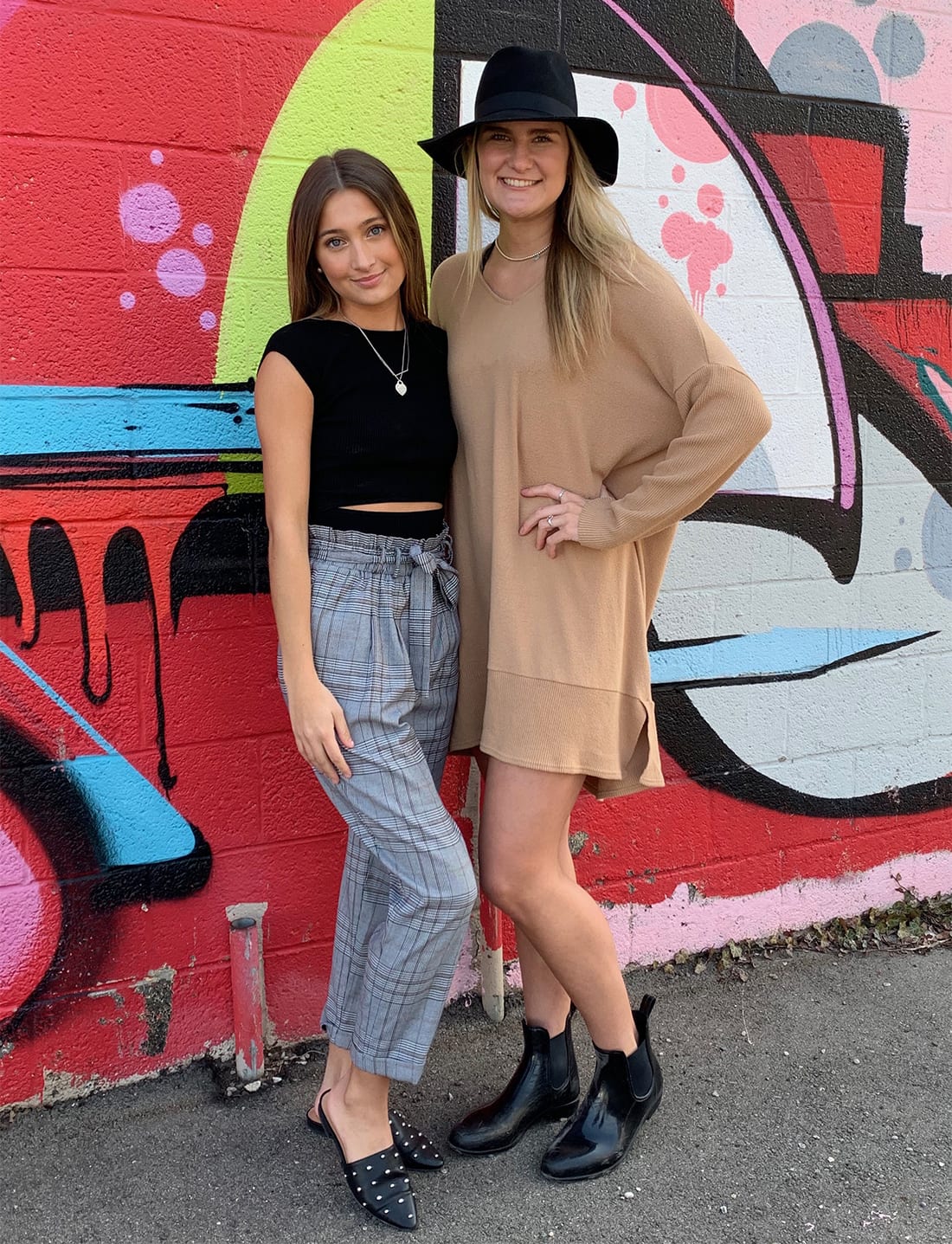
Jackie Smythe, supply chain management sophomore (left), and Olivia Miller, management sophomore (right)
“Through [the education abroad] program, Olivia Miller, Amanda Miner, Katherine Rojeck and I created INFKNIT Apparel as our final class project in Costa Rica,” Smythe said. “INFKNIT Apparel is sustainable, reversible apparel with a practical approach to design.
“Our mission is centered on minimizing the average closet, without compromising variety, while providing high-quality clothing sourced sustainably that will last through life’s wear and tear.”
The professors involved in the education abroad program were impressed and encouraged the team to join MSU Hatch to unfurl the business idea further. Smythe and her partners wound up having lunch with MSU President Stanley, launching a Kickstarter campaign and attending conferences, quickly extending their company’s reach.
“I never could’ve imagined the success that has already come from INFKNIT,” Smythe said. “I believed my career would begin after graduation and never anticipated to be simultaneously practicing things I’m learning in class while experiencing them in the professional world.
“To all entrepreneurs out there, keep your head up and be ready to work hard. Not everyone is going to think your idea is fantastic, but if you can continue to work hard to make your ideas a reality, you will succeed.”
Floating a fresh idea
Similarly, Brendan Wang and Jake Roach wanted to start a business to make an impact. Last year, they founded CAPNOS to create a safe alternative to vaping.
Despite the haziness of long-term effects and recent state bans on vaping, the flavored nicotine products in e-cigarettes are quite popular among millennials and Gen Z.
Wang, a supply chain management sophomore, was inspired to do something when he saw how serious the trend was becoming, specifically on campus. “I came back to MSU in September [2019] and I just saw how big of an issue it is,” he said.
Roach, a marketing junior, added, “I have a little sister who’s in sixth grade, and she’ll come home talking about how there’s kids vaping in class; it’s just getting worse and worse. I realized that this will continue to be a problem until someone takes action to stop it from getting worse.”
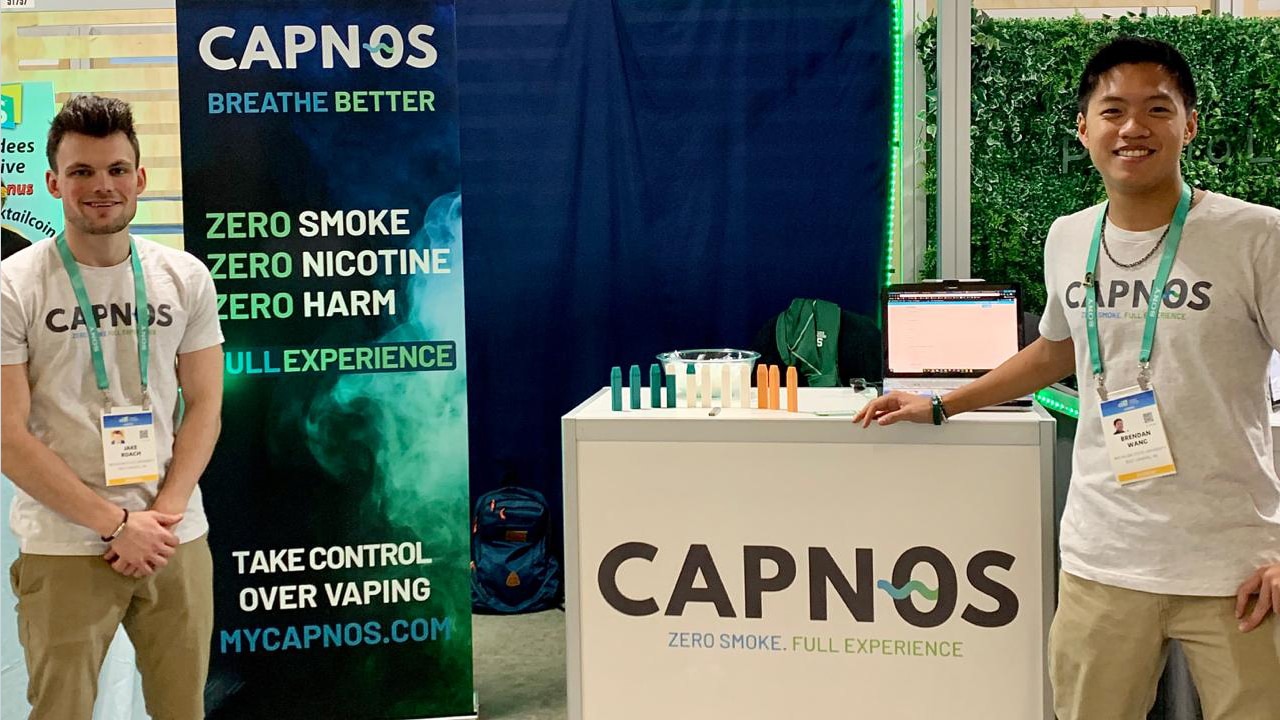
Jake Roach, marketing junior (left), and Brendan Wang, supply chain sophomore (right)
A few months after starting the business, Wang and Roach took their venture on the road to Las Vegas for CES 2020 — the nation’s largest consumer technology show — as one of just three Spartan groups there.
Wang shared that company representatives from all over the world spoke to him at CES, asking how they could get CAPNOS to their communities. He doesn’t have anything set in stone, he said, but would like to “take CAPNOS on a global level.”
“Overall, it was a tremendous experience,” he said. “I’ve met so many people who’ve shared their own stories about family members who struggle with addiction, and it makes me wonder how we can get [our product] on the market quicker and help people sooner.”
These students illustrate the strong entrepreneurial mindset that is at the core of being a Broad Spartan. We encourage diversity of thought and provide resources for our students to grow their ideas and make an immediate impact together.
STRENGTH IN NUMBERS
What It Means to “Go Green”
Our research will take railway transportation in North America to the next platform.
RESEARCH
From investing in clean energy on campus to dedicating resources and programs to further sustainability, MSU is taking strides to mitigate the threat of climate change in and beyond Michigan. This year, the Broad College’s Center for Railway Research and Education helped to continue MSU’s mission to “go green,” elevating railway transportation in North America to the next platform.
PURSUING AN ALTERNATIVE
Thanks to expertise from researchers at the CRRE, the first commercial hydrogen-powered train in North America will be hitting the tracks in 2024.
Nick Little, director of railway education with the CRRE, said, “MSU is acknowledged as a leader in the field of alternative traction for rail transportation. Our expertise has been built in the area of determining the potential for using hydrogen fuel cells along with battery energy storage, initially for passenger rail vehicles. This project, and other similar ones, are a natural fit.”
The San Bernardino County Transportation Authority (SBCTA) worked with the CRRE through a full funding grant from the California State Transportation Agency to explore low- or zero-emission options for its new Arrow railway service, which will operate over a nine-mile corridor in San Bernardino County, California.
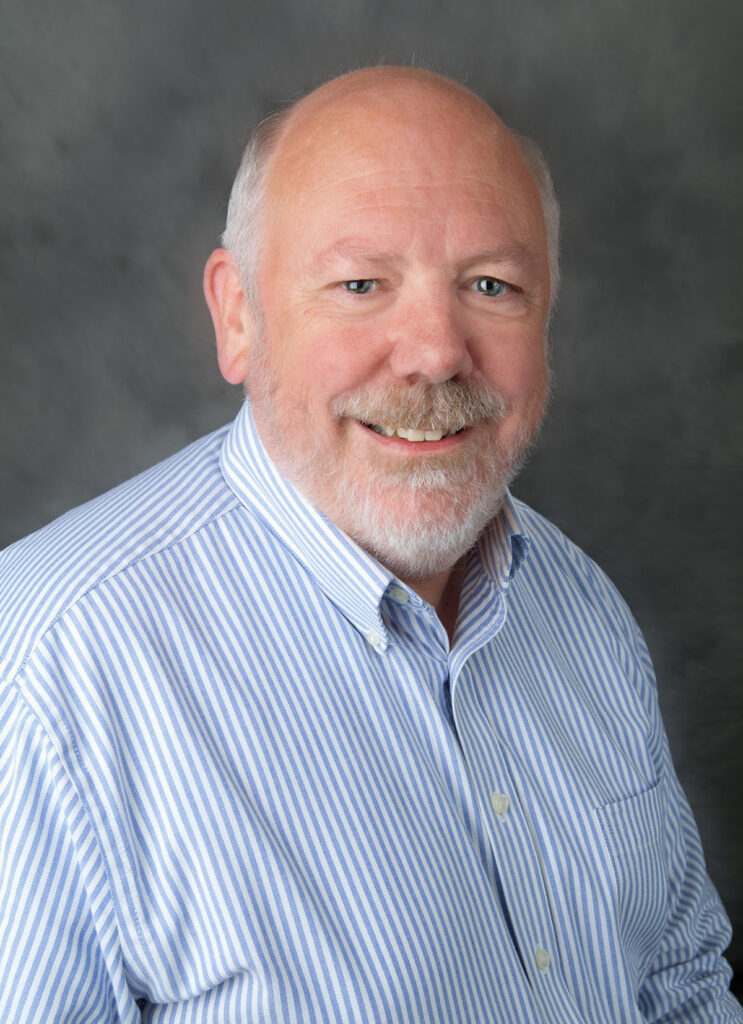
Nick Little, Director of Railway Education, CRRE
In partnership with the Birmingham Center for Railway Research and Education and Mott MacDonald, the CRRE was stationed on the project over the past year, evaluating the suitability of various technologies, estimating emission levels and conducting a high-level cost analysis for the Arrow service.
Beyond the nine-mile corridor, the research considered expansion of the service by approximately 60 miles — connecting San Bernardino to Los Angeles Union Station — and made recommendations based on which low- or zero-emission technology could best cover that route.
A new path forward
The researchers examined a range of solutions for SBCTA, like traditional wayside electrification, conventional diesel-electric, biofuels, natural gas, batteries, hydrogen fuel cell technology and hybrid powertrain options.
The team’s final recommendations proposed a battery-powered train or a hydrogen fuel cell hybrid train, and SBCTA decided in favor of the latter due to easier scalability and the potential larger service expansion.

Rendering of the Arrow railway service, the first commercial hydrogren-powered, zero-emission train
“MSU research and technical input was paramount in advancing the SBCTA Board of Directors’ decision to move forward with hydrogen-powered technology,” said Carrie Schindler, director of Transit and Rail Programs for SBCTA. “Being in one of the worst air quality areas in the nation, projects like this are critical to SBCTA’s mission to improve the quality of life for San Bernardino County residents.”
Little added, “MSU/CRRE’s work on this project helps apply our research expertise to addressing a critical issue facing many railway operations globally by improving air quality.”
Through the research efforts of the CRRE and other faculty experts across the Broad College, we consistently push forward together for a better tomorrow.
“MSU research and technical input was paramount in advancing the SBCTA Board of Directors’ decision to move forward with hydrogen-powered technology.”
—CARRIE SCHINDLER
STRENGTH IN NUMBERS
Letter From Dean Sanjay Gupta
ithout question, this year has been defined by moments that showcase our individual strength, collective power and extraordinary impact as Spartans. As we close this year and begin another, what does the future hold for the Broad College?
Our work is not done as U.S. higher education is being tested like never before. The global pandemic forced us to switch to remote teaching and learning overnight and is now forcing us to brace for a new normal. It’s apparent that the Broad College’s focus on the fourth industrial revolution — the digital transformation of business — will be critical in preparing tomorrow’s leaders.
In this transformation, fundamental changes are taking place based on the ubiquity of technology that redefine business processes around the world. And these changes have been amplified and accelerated at warp speed amid the pandemic. Our intentional efforts to redesign curriculum and introduce new courses and initiatives related to the digital transformation are just the beginning as we all embark on this next phase of business.
Coinciding with this is a greatly unsettled social and political landscape in which inequality and racism are still ever-present. Our next steps forward as a college will continue to be grounded in our values of diversity, equity and inclusion, as this is one of the core themes outlined in the Broad College Strategic Plan. We have already taken and are continuing to take various actions to address issues of diversity, equity and inclusion related to programmatic initiatives, curricular content and personnel decisions, which happen at the college level, as well as all department and program levels.
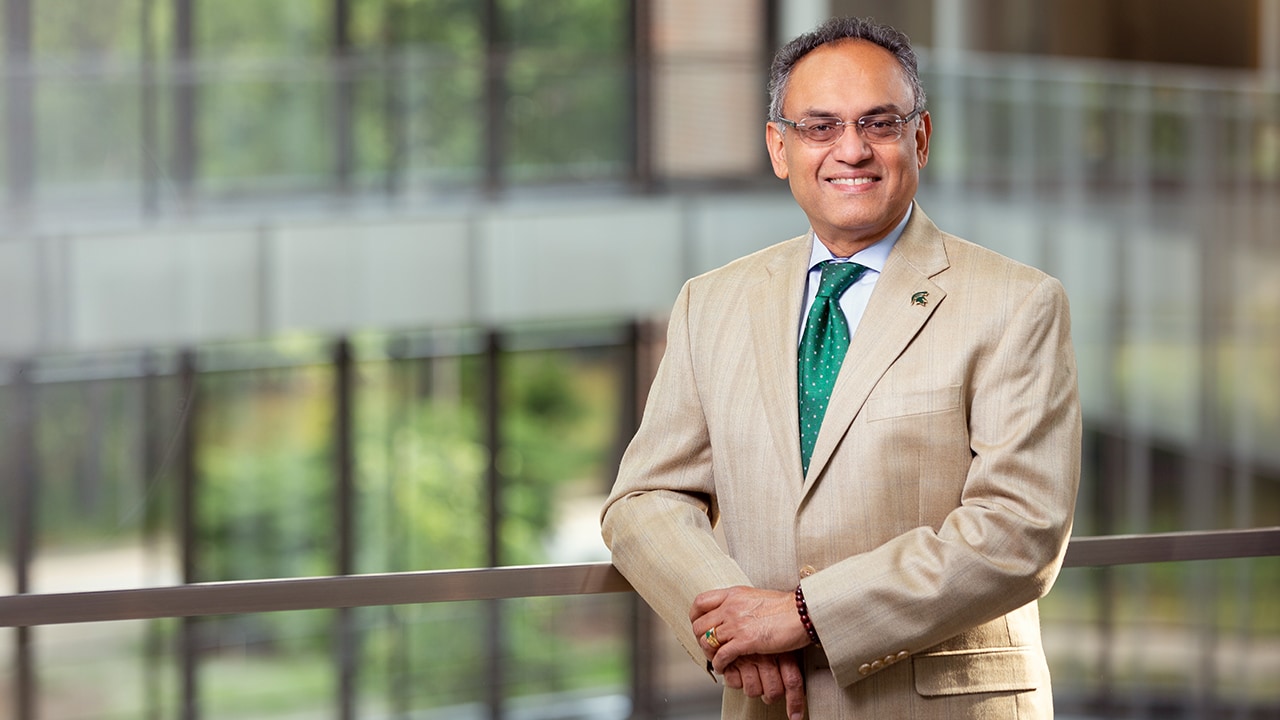
Eli and Edythe L. Broad Dean Sanjay Gupta
Our efforts to deepen our commitment to diversity, equity and inclusion will be purposeful and meaningful, ensuring that everyone in our community consciously acts to make our values a reality.
In addition, the current economic uncertainty and altered public policy priorities are exposing deep vulnerabilities in the public university financial model as potentially unsustainable. And so, we must ensure that the Broad College not only stays competitive in this volatile, uncertain, complex and ambiguous environment but in fact is recognized as a top-of-mind business school and realizes its fullest potential.
While we may not know exactly what the future of higher education will look like, our strategic themes and initiatives will relentlessly guide our work going forward. Our momentum will not falter as we strive to transform lives through undergraduate education, enhance careers and lifelong learning through graduate programs, strengthen impactful research and scholarship, enhance outreach and engagement with key communities and foster a diverse and inclusive culture of collaboration.
I am committed to working alongside our Broad faculty, staff, students, alumni and friends to lead the college to an even better tomorrow, seeking innovation in our programs, resilience in overcoming our challenges and excellence in our performance, while never forgetting the indomitable Spartan spirit and pride.
We, as Broad Spartans, have the strength, power, determination and grit to make progress for a better tomorrow, together.
WHO WILL MAKE BUSINESS HAPPEN? SPARTANS WILL.




